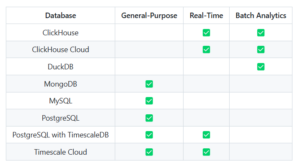Actual-time analytics pushes the boundaries on knowledge that distributed {hardware} and software program can ship. To adequately measure the relative efficiency of real-time analytics databases, Timescale in the present day launched a real-time analytics benchmark dubbed RTABench.
Timescale is a real-time analytics database supplier by the use of its flagship providing, TimescaleDB, which is a modified model of Postgres that treats time-series knowledge as a first-class knowledge kind. The software program has been adopted in gaming and different consumer-facing purposes which can be uncovered to fast-changing knowledge and require low-latency responses to many concurrent customers.
These three database capabilities–large concurrency, low latency, and real-time updates–are largely what individually the brand new crop of real-time analytics databases from their conventional column-store brethren. Whereas the info warehouses (or knowledge lakes) from distributors like Snowflake and Databricks can adequately deal with ad-hoc queries on huge knowledge units, corporations with real-time analytics wants typically flip to different distributors, corresponding to Timescale, ClickHouse, StarTree, Suggest, StarRocks, Materialize, and others.
“Traditionally, the trade has relied on TPC-H and TPC-DS as the usual benchmarks for evaluating analytical databases,” Timescale wrote in its weblog in the present day. “They’re designed to simulate enterprise intelligence and choice assist methods that run complicated, ad-hoc analytical queries throughout a number of tables on massive knowledge units.”
Timescale notes that ClickHouse launched ClickBench, a real-time analytics benchmark. A number of dozen databases have taken the take a look at because it launched in 2022, with the Umbra database at the moment holding the primary place. TimescaleDB exhibits 5 entries within the ClickBench outcomes, the place it sits within the backside 25%.
Whereas ClickBench has acquired fairly a little bit of consideration, the parents at Timescale weren’t solely pleased with it. The corporate says that the best way ClickBench evaluates databases–by “utilizing a single desk of clickstream knowledge, consultant of workloads like internet analytics, BI, and log aggregation”–isn’t conducive to the a good listening to on the complete breadth of real-time analytic workloads.
“It [ClickBench] additionally favors full-table massive scans and large-scale aggregations on denormalized knowledge,” Timescale says in its weblog. “Full desk scans and huge aggregations on a single denormalized desk don’t successfully signify the question patterns in purposes delivering real-time analytics.”
So Timecale developed its personal benchmark to raised tackle the real-world workloads that it sees real-time analytics being requested to run. What makes RTABench totally different is the way it handles behind-the-scenes knowledge duties in real-time analytics databases, corresponding to joins, filters, and pre-aggregations.
As an illustration, database joins are essential to convey collectively tables storing disparate knowledge, corresponding to occasion knowledge and metadata, Timescale says. “You want quick joins on recent knowledge to retrieve associated data from a number of tables,” the corporate writes within the weblog.
Filtering and indexing are different frequent database strategies to keep away from the dreaded full-table scans. “Databases constructed for real-time purposes should excel at indexing, partitioning, and quick lookups–not simply bulk aggregations over massive datasets,” Timescale writes.
Pre-aggregations are one other frequent solution to velocity up the inevitable queries that can come down the pike. “Present benchmarks like ClickBench don’t benchmark pre-aggregation,” Timescale writes, “however many real-time purposes rely upon it for sub-second response instances.”
To develop RTABench, Timescale began with the open supply ClickBench framework, after which modified it with totally different knowledge and queries. It additionally created RTABench to work on normalized knowledge (i.e. knowledge straight from the database), versus engaged on denormalized knowledge, as ClickBench has finished.
The database that Timescale created for the benchmark incorporates 171 million order occasions, about 1,100 prospects, greater than 9,250 merchandise, and about 10 million historic orders. Timescale then created 40 queries which can be designed to check how the database handles frequent duties, corresponding to counting the variety of departed shipments per day from a selected terminal, discovering the final recorded standing of a given order, or exhibiting the entire income generated by every buyer within the final 30 days.
“RTABench is a brand new benchmark we now have developed to guage databases utilizing question patterns that mirror real-world utility workloads–one thing lacking from current benchmarks,” Timescale says in its weblog. “In contrast to ClickBench and different benchmarks, RTABench intently displays the precise wants of real-time analytics purposes, measuring key elements corresponding to joins, selective filtering, and pre-aggregations.”
The corporate determined to depart out a number of measurements. As an illustration, whereas pre-aggregation queries utilizing incrementally up to date materialized views is a vital characteristic of its database, solely TimescaleDB and ClickHouse at the moment assist these options, so it left that out. It additionally neglected knowledge ingest and high-concurrency queries.
“These additions would add quite a lot of complexity, make the benchmark a lot more durable and longer to run, and introduce extra variance within the outcomes, making them more durable to breed and interpret,” the corporate famous. “We’ve determined to depart these out to make the benchmark simpler to make use of, however we are going to discover methods so as to add them whereas preserving the benchmark easy to run and interpret.”
The corporate is publishing the outcomes of RTABench checks at rtabench.com. TimescaleDB, Clickhouse, MongoDB, Postgres, and MySQL at the moment are the one databases which have been examined. The corporate is brazenly soliciting folks to assist with the undertaking. You possibly can learn extra on the corporate’s weblog put up.
Associated Gadgets:
Slicing and Dicing the Actual-Time Analytics Database Market
TimescaleDB Is a Vector Database Now, Too
Actual-Time Analytics Databases Emerge to Take On Large, Quick-Shifting Knowledge



